- Home
- Margaret Atwood
Alias Grace Page 7
Alias Grace Read online
Page 7
When you are sad it is best to change the subject. I asked if he had a mother living, and he said yes, although her health was not good; and I said that he was fortunate to have a mother living, as mine was not. And then I changed the subject again, and said I was very fond of horses, and he told me about his horse Bess, that he had as a boy. And after a time, I don't know how it was, but little by little I found I could talk to him more easily, and think up things to say.
And that is how we go on. He asks a question, and I say an answer, and he writes it down. In the courtroom, every word that came out of my mouth was as if burnt into the paper they were writing it on, and once I said a thing I knew I could never get the words back; only they were the wrong words, because whatever I said would be twisted around, even if it was the plain truth in the first place. And it was the same with Dr. Bannerling at the Asylum. But now I feel as if everything I say is right. As long as I say something, anything at all, Dr. Jordan smiles and writes it down, and tells me I am doing well.
While he writes, I feel as if he is drawing me; or not drawing me, drawing on me - drawing on my skin - not with the pencil he is using, but with an old-fashioned goose pen, and not with the quill end but with the feather end. As if hundreds of butterflies have settled all over my face, and are softly opening and closing their wings.
But underneath that is another feeling, a feeling of being wide-eyed awake and watchful. It's like being wakened suddenly in the middle of the night, by a hand over your face, and you sit up with your heart going fast, and no one is there. And underneath that is another feeling still, a feeling like being torn open; not like a body of flesh, it is not painful as such, but like a peach; and not even torn open, but too ripe and splitting open of its own accord.
And inside the peach there's a stone.
9.
From Dr. Samuel Bannerling, M.D., The Maples, Front Street,
Toronto, Canada West; to Dr. Simon Jordan, M.D., care of Mrs.
William P. Jordan, Laburnum House, Loomisville, Massachusetts,
The United States of America. Redirected, care of Major C. D.
Humphrey, Lower Union Street, Kingston, Canada West.
April 20th, 1859.
Dear Dr. Jordan:
I am in receipt of your request to Dr. Workman of April 2nd, concerning the convict Grace Marks, and of a note from him asking that I supply you with any further information at my disposal.
I must inform you at once that Dr. Workman and I have not always seen eye to eye. In my estimation - and I was at the Asylum for more years than he has yet been there - his policies of leniency have led him to undertake a fool's errand, namely the transforming of sows' ears into silk purses. Most who suffer from the more severe nervous and cerebral disorders cannot be cured, but merely controlled; for which purposes, physical restraint and correction, a restricted diet, and cupping and bleeding to reduce excessive animal spirits, have in the past proven efficacious enough. Although Dr. Workman claims to have obtained positive results in several cases previously considered hopeless, these supposed cures will no doubt in time prove to have been superficial and temporary. The taint of insanity is in the blood, and cannot be removed with a little soft soap and flannel.
Dr. Workman had the opportunity of examining Grace Marks for a few weeks only, whereas I had her under my care for over a year; and therefore his opinions on the subject of her character cannot be worth a great deal. He was, however, perspicacious enough to discover one pertinent fact - namely that, as a lunatic, Grace Marks was a sham - a view previously arrived at by myself, although the authorities of that time refused to act upon it. Continuous observation of her, and of her contrived antics, led me to deduce that she was not in fact insane, as she pretended, but was attempting to pull the wool over my eyes in a studied and flagrant manner. To speak plainly, her madness was a fraud and an imposture, adopted by her in order that she might indulge herself and be indulged, the strict regimen of the Penitentiary, where she had been placed as a just punishment for her atrocious crimes, not having been to her liking.
She is an accomplished actress and a most practised liar. While among us, she amused herself with a number of supposed fits, hallucinations, caperings, warblings and the like, nothing being lacking to the impersonation but Ophelia's wildflowers entwined in her hair; but she did well enough without them, as she managed to deceive, not only the worthy Mrs. Moodie, who like many high-minded females of her type, is inclined to believe any piece of theatrical twaddle served up to her, provided it is pathetic enough, and whose inaccurate and hysterical account of the whole sad affair you have no doubt read; but also several of my own colleagues, this latter being an outstanding example of the old rule of thumb, that when a handsome woman walks in through the door, good judgment flies out through the window.
Should you nonetheless decide to examine Grace Marks at her current place of abode, be pleased to consider yourself amply warned. Many older and wiser heads have been enmeshed in her toils, and you would do well to stop your ears with wax, as Ulysses made his sailors do, to escape the Sirens. She is as devoid of morals as she is of scruples, and will use any unwitting tool that comes to hand.
I should alert you also to the possibility that, once having involved yourself in her case, you will be besieged by a crowd of well-meaning but feeble-minded persons of both sexes, as well as clergymen, who have busied themselves on her behalf. They pester the Government with petitions for her release, and will attempt in the name of charity to waylay and conscript you. I have had repeatedly to beat them away from my door, whilst informing them that Grace Marks has been incarcerated for a very good reason, namely the vicious acts which she has committed, and which were inspired by her degenerate character and morbid imagination. To let her loose upon an unsuspecting public would be irresponsible to the last degree, as it would merely afford her the opportunity of gratifying her bloodthirsty tastes.
I am confident that, should you choose to explore the matter further, you will arrive at the same conclusions as have already been arrived at, by,
Your obedient servant,
(Dr.) Samuel Bannerling, M.D.
10.
This morning Simon is to meet with Reverend Verringer. He's not looking forward to it: the man has studied in England, and is bound to give himself airs. There is no fool like an educated fool, and Simon will have to trot out his own European credentials, and flourish his erudition, and justify himself. It will be a trying interview, and Simon will be tempted to start drawling, and saying I reckon, and acting the British Colonial version of the wooden-nutmeg-peddling Yankee, just to annoy. He must restrain himself, however; too much depends on his good behaviour. He keeps forgetting he is no longer rich, and therefore no longer entirely his own man.
He stands in front of his looking glass, attempting to tie his stock. He hates cravats and stocks, and wishes them at the Devil; he resents his trousers as well, and all stiff and proper clothing generally. Why does civilized man see fit to torture his body by cramming it into the strait-jacket of gentlemanly dress? Perhaps it is a mortification of the flesh, like a hair shirt. Men ought to be born in little woollen suits which would grow with them over the years, thus avoiding the whole business of tailors, with their endless fussing and snobberies.
At least he isn't a woman, and thus not obliged to wear corsets, and to deform himself with tight lacing. For the widely held view that women are weak-spined and jelly-like by nature, and would slump to the floor like melted cheese if not roped in, he has nothing but contempt. While a medical student, he dissected a good many women - from the labouring classes, naturally - and their spines and musculature were on the average no feebler than those of men, although many suffered from rickets.
He's wrestled his stock into the semblance of a bow. It's lopsided, but the best he can do; he can no longer afford a valet. He brushes down his unruly hair, which rebounds instantly. Then he takes up his topcoat, and on second thought his umbrella. There's a weak sunlight making its wa
y in through the windows, but it's too much to hope that it won't rain. Kingston in the spring is a watery place.
He makes his way stealthily down the front stairs, but not stealthily enough: his landlady has taken to waylaying him on some trivial matter or another, and she glides out from the parlour now, in her faded black silk and lace collar, clutching her customary handkerchief in one thin hand, as if tears are never far off. She was obviously a beauty not so long ago, and could still be one if she would take the trouble to be so, and if the centre parting in her fair hair were not quite so severe. Her face is heart-shaped, her skin milky, her eyes large and compelling; but although her waist is slender, there is something metallic about it, as if she is using a short length of stove-pipe instead of stays. Today she wears her habitual expression of strained anxiety; she smells of violets, and also of camphor - she is doubtless prone to headaches - and of something else he can't quite place. A hot dry smell. A white linen sheet being ironed?
As a rule, Simon avoids her type of attenuated and quietly distraught female, although doctors attract such women like magnets. Still, there's a severe and unadorned elegance about her - like a Quaker meeting house - which has its appeal; an appeal which, for him, is aesthetic only. One does not make love to a minor religious edifice.
"Dr. Jordan," she says. "I wanted to ask you ..." She hesitates. Simon smiles, prompting her to get on with it. "Your egg this morning - was it satisfactory? This time I cooked it myself."
Simon lies. To do otherwise would be unpardonably rude. "Delicious, thank you," he says. In reality the egg had the consistency of the excised tumour a fellow medical student once slipped into his pocket for a joke - both hard and spongy at the same time. It takes a perverse talent to maltreat an egg so completely.
"I am so glad," she says. "It is so difficult to get good help. You are going out?"
The fact is so obvious that Simon merely inclines his head.
"There is another letter for you," she says. "The servant mislaid it, but I have found it again. I have placed it on the hall table." She says this tremulously, as if any letter for Simon must be tragic in content. Her lips are full, but fragile, like a rose on the verge of collapse.
Simon thanks her, says goodbye, picks up his letter - it's from his mother - and leaves. He doesn't wish to encourage long conversations with Mrs. Humphrey. She's lonely - as well she might be, married to the sodden and straying Major - and loneliness in a woman is like hunger in a dog. He has no wish to be the recipient of dolorous afternoon confidences, behind drawn curtains, in the parlour.
Nonetheless she's an interesting study. Her idea of herself, for instance, is much more exalted than her present circumstances warrant. Surely there was a governess in her childhood: the set of her shoulders proclaims it. So fastidious and stern was she when he was arranging for the rooms, that he'd found it embarrassing to ask whether washing was included. Her manner had implied that she was not in the habit of discussing the state of men's personal items with them, such painful matters being best left to the servants.
She'd made it clear, although indirectly, that it was much against her will that she'd been forced to let lodgings. This was the first time she'd done so; it was due to an encumbrance which would surely prove temporary. Moreover, she was very particular - A gentleman of quiet habits, if willing to take meals elsewhere, her notice had read. When, after an inspection of the rooms, Simon had said he wished to take them, she'd hesitated, and then asked for two months' rent in advance.
Simon had seen the other lodgings on offer, which were either too expensive for him or much dirtier, so he'd agreed. He'd had the sum with him in ready cash. He'd noted with interest the blend of reluctance and eagerness she'd displayed, and the nervous flush this conflict had brought to her cheeks. The subject was distasteful to her, almost indecent; she hadn't wanted to touch his money in a naked state, and would have preferred it to be enclosed in an envelope; yet she'd had to restrain herself from snatching at it.
It was much the same attitude - the coyness about fiscal exchange, the pretence that it hadn't really taken place, the underlying avidity - that characterized the better class of French whore, although the whores were less gauche about it. Simon doesn't consider himself an authority in this area, but he would have failed in his duty to his vocation if he'd refused to profit by the opportunities Europe afforded - opportunities which were by no means so available, nor so various, in New England. To heal humanity one must know it, and one cannot know it from a distance; one must rub elbows with it, so to speak. He considers it the duty of those in his profession to probe life's uttermost depths, and although he has not probed very many of them as yet, he has at least made a beginning. He'd taken, of course, all proper precautions against disease.
Outside the house he encounters the Major, who stares at him as if through a dense fog. His eyes are pink, his stock is askew, and he is missing a glove. Simon tries to imagine what sort of debauch he's been on, and how long it has lasted. There must be a certain freedom in not having a good name to lose. He nods, and lifts his hat. The Major looks affronted.
Simon sets out to walk to Reverend Verringer's residence, which is on Sydenham Street. He hasn't hired a carriage or even a horse; the expense would not be not justified, as Kingston is not a large place. The streets are muddy and cluttered with horse dung, but he has good boots.
The door of Reverend Verringer's impressive manse is opened by an elderly female with a face like a pine plank; the Reverend is unmarried, and has need of an irreproachable housekeeper. Simon is ushered into the library. It is so self-consciously the right sort of library that he has an urge to set fire to it.
Reverend Verringer rises from a leather-covered wing chair, and offers him a hand to shake. Although his hair and his skin are equally thin and pallid, his handshake is surprisingly firm; and despite his unfortunately small and pouting mouth - like a tadpole's, thinks Simon - his Roman nose indicates a strong character, his high-domed forehead a developed intellect, and his somewhat bulging eyes are bright and keen. He cannot be over thirty-five; he must be well connected, thinks Simon, to have risen so fast in the Methodist establishment, and to have procured such an affluent congregation. Considering the books, he must have money of his own. Simon's father used to have books like that.
"I am glad you could come, Dr. Jordan," he says; his voice is less affected than Simon has feared. "It is kind of you to oblige us. Your time must be valuable indeed." They sit, and coffee appears, brought in by the slab-faced housekeeper on a tray which is plain in design, but nonetheless of silver. A Methodist tray: not flamboyant, but quietly affirmative of its own worth.
"It is a matter of great professional interest to me," says Simon. "It is not often that such a case presents itself, with so many intriguing features." He speaks as if he personally has treated hundreds of cases. The thing is to look interested, but not too eager, as if the favour is being conferred by him. He hopes he's not blushing.
"A report from you would be a considerable help to our Committee," says Reverend Verringer, "should such a report favour the theory of innocence. We would attach it to our Petition; Government authorities are much more inclined nowadays to take expert opinion into consideration. Of course," he adds, with a shrewd glance, "you will be paid the sum agreed on, no matter what your conclusions."
"I fully understand," says Simon with what he hopes is an urbane smile. "You studied in England, I think?"
"I began the pursuit of my vocation as a member of the Established Church," says Reverend Verringer, "but then had a crisis of conscience. Surely the light of God's word and grace is available to those outside the Church of England, and through more direct means than the Liturgy."
"I would certainly hope so," says Simon politely.
"The eminent Reverend Egerton Ryerson, of Toronto, followed much the same course. He is a leader in the crusade for free schooling, and for the abolition of alcoholic beverages. You have heard of him, naturally."
Simon h
as not; he emits an ambiguous h'm, which he hopes will pass for agreement.
"You yourself are ...?"
Simon dodges. "My father's family was Quaker," he says. "For many years. My mother is a Unitarian."
"Ah yes," says Reverend Verringer. "Of course, everything is so different in the United States." There is a pause, while they both consider this. "But you do believe in the immortality of the soul?"
This is the trick question; this is the trap that might put paid to his chances. "Oh yes, of course," says Simon. "It is not to be doubted."
Verringer seems relieved. "So many scientific men are casting doubts. Leave the body to the doctors, I say, and the soul to God. Render unto Caesar, you might say."
"Of course, of course."
"Dr. Binswanger spoke very highly of you. I had the pleasure of meeting him while travelling on the Continent - Switzerland is of great interest to me, for historical reasons - and I talked with him of his work; and therefore it was natural for me to consult him, when seeking an authority on this side of the Atlantic. An authority" - he hesitates - "who would be within our means. He said you are well up on cerebral diseases and nervous afflictions, and that in matters concerning amnesia you are on your way to becoming a leading expert. He claims you are one of the up-and-coming men."
"It is kind of him to say so," Simon murmurs. "It is a baffling area. But I have published two or three little papers."
"Let us hope that, at the conclusion of your investigations, you will be able to add to their number, and to shed light on a puzzling obscurity; for which society will give you due recognition, I am sure. Especially in such a famous case."
Simon notes to himself that, although tadpole-mouthed, Reverend Verringer is no fool. Certainly he has a sharp nose for other men's ambitions. Could it be that his switch from the Church of England to the Methodists had coincided with the falling political star of the former in this country, and the rising one of the latter?

 Surfacing
Surfacing Hag-Seed
Hag-Seed Oryx and Crake
Oryx and Crake The Heart Goes Last
The Heart Goes Last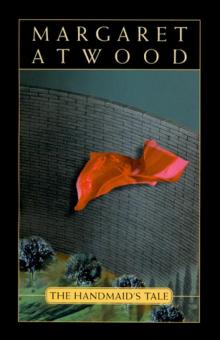 The Handmaid's Tale
The Handmaid's Tale Lady Oracle
Lady Oracle Good Bones and Simple Murders
Good Bones and Simple Murders The Robber Bride
The Robber Bride Life Before Man
Life Before Man Alias Grace
Alias Grace The Blind Assassin
The Blind Assassin Cat's Eye
Cat's Eye The Testaments
The Testaments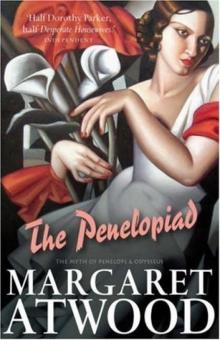 The Penelopiad
The Penelopiad MaddAddam
MaddAddam Dancing Girls & Other Stories
Dancing Girls & Other Stories On Writers and Writing
On Writers and Writing Selected Poems II (1976-1986)
Selected Poems II (1976-1986) Wilderness Tips
Wilderness Tips Dearly
Dearly The Tent
The Tent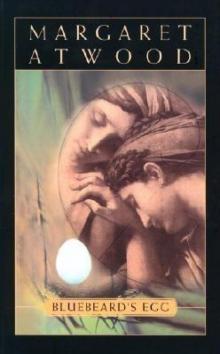 Bluebeard's Egg
Bluebeard's Egg The Edible Woman
The Edible Woman The Penelopiad: The Myth of Penelope and Odysseus
The Penelopiad: The Myth of Penelope and Odysseus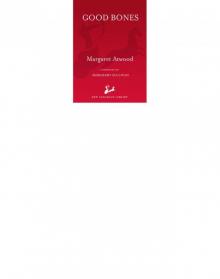 Good Bones
Good Bones I Dream of Zenia with the Bright Red Teeth
I Dream of Zenia with the Bright Red Teeth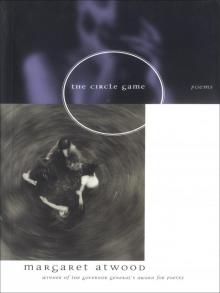 Circle Game
Circle Game Choke Collar: Positron, Episode Two
Choke Collar: Positron, Episode Two Stone Mattress: Nine Tales
Stone Mattress: Nine Tales The MaddAddam Trilogy
The MaddAddam Trilogy Stone Mattress
Stone Mattress Power Politics
Power Politics MaddAddam 03 - MaddAddam
MaddAddam 03 - MaddAddam I’m Starved for You (Kindle Single)
I’m Starved for You (Kindle Single) Murder in the Dark
Murder in the Dark In Other Worlds
In Other Worlds Dancing Girls
Dancing Girls Moral Disorder
Moral Disorder